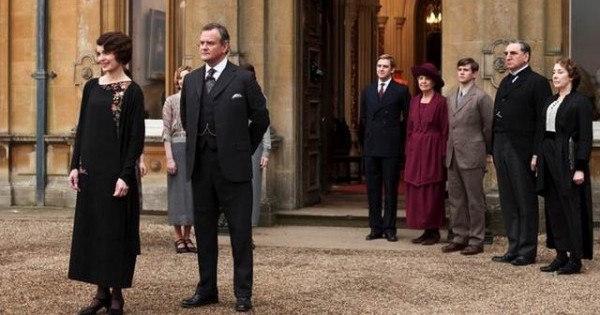
Downton Abbey, that orgy of noblesse oblige and ladies’ hats, has revived the commonplaces about America’s love affair with the English aristocracy. But why is it always the same aristocracy? Why always the Edwardians, as it was in Upstairs, Downstairs, in The Forsyte Saga (the book your parents had in the living room), in those Merchant Ivory E. M. Forsters? Why never the Victorians, never the Georgians, never anything (other than the Austen cult) from the wide field of the 19th or 18th or earlier centuries?
Things are a lot more fun with motorcars and decent plumbing, but I don’t think that’s really the heart of it. The Edwardians have history on their side—which is to say, on the other side. Because it’s almost never only the Edwardians. We start in that Indian summer of Empire, but then comes the war, and the crash, and the slump—the whole procession of decline and fall. Upstairs, Downstairs started in 1903 but ended in 1930. Downton Abbey, which is basically Upstairs, Downstairs with better production values, saved time by starting in 1912. Even when the story stops before the guns of August, a sense of what’s to come hangs over the proceedings. The Edwardians possess that priceless dramatic asset: the pathos of dying aristocracies.
Power breeds wealth. Wealth refines itself, in the course of generations, into leisure, into culture. But from leisure it is just a step to idleness, and thence to decadence and weakness and collapse. The slow old civilization is devoured by a vigorous upstart, as Troy gives way to Greece in the Iliad, Carthage in the Aeneid and Egypt in Antony and Cleopatra to Rome, Europe to America in Henry James, the upper to the middle class in Downton Abbey. But the culture that has flowered in that age of leisured ascendancy is enormously appealing, not least to the arrivistes: elegant and gracious and refined, an ideal image of freedom and beauty. Hence the pathos of its death.
Hence the self-pity, as well, of which there’s quite a bit in Downton Abbey. Julian Fellowes, Downton’s creator (or Julian Alexander Kitchener-Fellowes, Baron Fellowes of West Stafford DL, to grant him his full name and title), is said to be developing a kind of American counterpart, to be set (speaking of Henry James) in Gilded Age New York. I doubt that it will catch; Americans are much less interested in our own aristocracy, for the simple reason that we don’t like to acknowledge that we had one. But we did, and it also had its mournful decline, albeit somewhat later. I think of The New Yorker in the days of William Shawn, during the ’50s and ’60s and ’70s, as the WASPs, in all their prep-school glory, were slowly buried by the multicultural horde—of writers like E. B. White and J. D. Salinger and George W. S. Trow, with their elegiac charm, their glamorous fatalism. So sad, so sad. But then the Jew in me rears up and makes me think, tough shit, you had your chance. The fact is that the threatened fall of Downton Abbey leaves me cold. Step aside, you lazy toffs. Time to give somebody else a turn.

